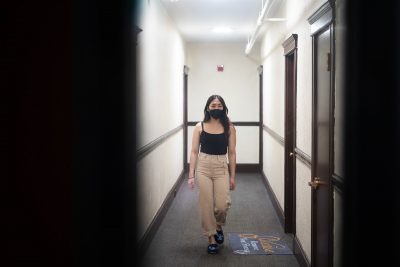
Since the Fall, students living in on-campus dormitories have been expected to form “households” within their residences and establish COVID-19 residential protocols on mask-wearing and social distancing based on each other’s personal preferences.
However, some students were sent a stricter set of residential COVID-19 protocols by their resident assistants for the Spring semester than in the Fall.
Phoenix Kavadas-Pietrangelo, a senior in the College of Arts and Sciences living in a brownstone on Bay State Road, said he received a Slack message from his RA last week detailing stricter mask-wearing policies than the previous semester.
“Masks must be worn whenever you are in a space that is not your assigned space,” Kavadas-Pietrangelo’s RA wrote. “Unfortunately, that includes visiting other rooms within your own household and visiting the bathroom.”
The RA added if a student is found without a mask in a shared space it would be documented as a campus mask violation.
“Eating cannot take place in the common area,” they wrote, “as it requires you to remove your mask for an extended period of time.”
Kavadas-Pietrangelo said he was not on campus last semester but questions whether all of these restrictions are necessary.
“I feel like some of it might be a bit excessive,” he said, “in that prior to the notification coming out or the change coming out, that wasn’t happening.”
Kavadas-Pietrangelo added residents of brownstones — typically small spaces — are very likely to come into contact with each other anyway.
“It’s not that it’s unreasonable, I just feel like it might be a lot,” he said. “But I also do what needs to be done.”
According to the Back2BU website, students “must exercise careful control of how shared spaces are used and maintained, and everything from bathroom use to household cleaning to shared elevator use must be scheduled and coordinated.”
BU spokesperson Colin Riley said households are –– and have been –– managed from the students’ end, with RAs helping to facilitate the process.
“The key here really is, and I want to stress it, is using common sense, good judgment, understanding what is taking place out there and the purpose for all of these public health measures,” Riley said.
The University has not made any changes to its public health policies on a campus-wide basis, he said.
“The same mask-wearing guidance and other public health measures from the Fall still apply in the Spring semester with no additional changes,” Riley wrote in an email.
College of Communication junior Mackenzie Arnolds, a resident of a Bay State brownstone, said her RA sent out an email reminding residents of the residential COVID-19 guidelines but they didn’t meet to discuss planning a household.
Arnolds said she thought the email reminding residents of the guidelines was “redundant” because she and people within her household have been following these measures.
“I feel like I’m a little surprised that they’re even being so explicitly instituted,” Arnolds said, “because that is just what everyone’s been doing in my brownstone.”
She cited the need for these restrictions as most likely due to the lack of oversight in the brownstones.
“I’ve never even met my RA in person, so I feel like it’s probably more difficult to legislate how people act in the dorms,” she said. “So maybe they need to more explicitly express these guidelines.”
One RA, who requested to remain anonymous, said they weren’t aware of new or stricter protocols being put in place for mask-wearing. However they added they wish better communication was prioritized among RA’s to stay in-the-know on updates to COVID-19 safety.
“I think every RA should be aware of any rules, specifically with COVID guidelines,” the RA said, “that could impact their job or their communities in any standpoint.”
RAs receive updates on COVID-19 safety during their weekly Wednesday night meetings, they said, or via email.
They cited a complicating factor being that each “neighborhood” –– divided areas of campus RAs live and work in –– operates separately depending on the style of residence.
“The household COVID-planning situation is different per neighborhood,” the RA said. “We were briefed on that very heavily at the start of this academic year because it’s the core of how BU stays open.”
They said the stricter mask-wearing policies sent to students by their RAs seem as though they violate the household rule — brownstones are small enough that they can be made up of a single household.
“If they’re forced to wear masks in any common space but they’re already a part of a household, that seems contradictory to me,” the RA said, “but also is for public safety at the same time.”
Kavadas-Pietrangelo said he believes his entire brownstone is a household because there are only eleven people and one RA living there.
The RA said they think better communication between neighborhoods is needed and necessary to help RAs and residents be on the same page.
“I think BU’s been doing a phenomenal job with the COVID safety and guidelines,” they said. “I just wish there’s a little bit more communication between neighborhoods.”
























































































































